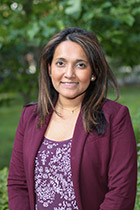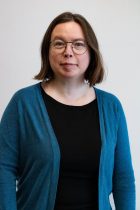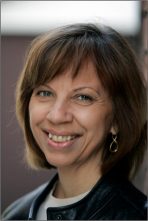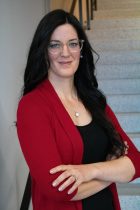Meet the Engineering Communication Program Tutoring Centre team of instructors:


Dr. Faye D'Silva
Faye D’Silva holds a PhD in Education from The Ohio State University (OSU) and an MA in Teaching and Learning with a specialization in multilingual education. Her expertise lies in working with multilingual students with a focus on discipline-specific communication. She has taught academic discursive skills to international undergraduate and graduate students at both OSU and the University of Toronto and currently instructs undergraduate students in the Engineering Communication Program (ECP) in ESP 1 & II and ECE295. As a Coordinator of the ECP Tutoring Centre and Professional Language Development (PLD) program, she runs the academic language screening program during the summer and conducts diagnostic assessments along with a team of PLD diagnostic assessors. Her research interest explores how multilingual writers construct texts and navigate post secondary discursive environments with a focus on discipline-specific contexts.
Emily Anglin
Emily Anglin holds an MA in Creative Writing from Concordia University and a PhD in English from Queen’s University. In addition to her work as a Writing Instructor with the Engineering Communication Program, she has taught literature and writing at Concordia, Queen’s, Algoma, and St. Jerome’s Universities. She is also a professional editor, specializing in memoir, academic writing, and fiction. Emily is the author of the short-story collection The Third Person (Book*hug 2017) and the novella Dissolving Views (Coach House Books, June 2021). Her creative writing has also appeared in Minola Review, carte blanche, The New Quarterly, The Whitewall Review, and in the chapbook The Mysteries of Jupiter. Her academic research on how the early modern universities were shaped by political pressures, as seen through the lens of early modern literature, has been published in journals including English Studies in Canada and Shakespeare.

Dr. Maria Cioni
Maria Cioni has a doctorate in History from Girton College, Cambridge University. In addition to academic publications, Maria’s literary non-fiction book, Spaghetti Western: How My Father Brought Italian Food to the West, is published in both print and audio book format. Maria holds a TESOL Canada qualification and applies her years of experience in international education to working with multilingual students to develop their professional engineering communication skills. She has been a Senior Lecturer in APS111T/APS112T courses and a communication instructor in ECE496 and ECE297. Maria continues to write and publish literary non-fiction and she mentors students and writers in creative writing, particularly the literary non-fiction genre.
Catriona Wright
Catriona Wright received her BA in English and History from McGill University and her MA in English in the Field of Creative Writing from the University of Toronto, where she completed a manuscript of short stories under the supervision of Barbara Gowdy. She has led creative writing workshops for high school students and has tutored students from a variety of academic backgrounds. She is also a TESL Canada certified ESL instructor, and she taught communication, English grammar and academic writing courses for three years prior to joining the Engineering Communication team at the University of Toronto. Her award-winning poetry, short fiction and essays have appeared in numerous Canadian publications, including The New Quarterly, Grain, Joyland, PRISM International and Prairie Fire.

Patricia Peters
Patricia Peters holds an MA in Applied Linguistics and an MFA in Creative Writing and is currently working on a doctorate. She holds certificates in English Language Education (Cambridge), Advanced Spanish and poetry. She spent eleven years living in Spanish-speaking countries where she taught in a variety of contexts from International Schools to Seminaries. Besides working with the Engineering Communication Program, she is a freelance editor and has edited literary magazines. Her poetry and creative non-fiction have appeared in a variety of publications and anthologies including CV2, Entropy, and Pensive.
Dr. Simon Watson
Dr. Simon Watson holds a PhD in Theology from the University of St. Michael’s College in the University of Toronto. His interdisciplinary research culminated in his book, Christ, Creation, and the Fall: Discerning Human Purpose from an Evolving Nature (Rowman & Littlefield, 2021). As a Research Associate in York University’s Department of Biology, Simon contributed to an international interprofessional team investigating climate change and lake ice. The team’s work was published in PLOS ONE. Simon also holds an MTS from Emmanuel College (University of Toronto), an MA in English and Creative Writing (University of Windsor), a BEd (OISE), and a TEFL Certificate (OISE). His writing has appeared in various publications, including the Queen’s Quarterly, the Canadian Medical Association Journal, Toronto Life, Studies in Religion/Sciences Religieuses, and the Toronto Journal of Theology. He is currently a Communication Instructor for APS111/APS112 and ECE496, and a Sessional Lecturer for CIV282 and ECE297.
Rhonda Bowen
Rhonda Bowen holds a BA in Communication and a M.Ed in Languages and Literacy. She also holds certification in English Language Teaching and has, over the last ten years, taught locally and internationally in a range of learning contexts. These include instructing at colleges overseas, teaching academic English to students preparing for university, as well as supporting the transition of immigrants to Canada through English language instruction. During this time she has also authored several commercial fiction titles written from racialized and feminist perspectives and continues to write in this genre. Since joining the Engineering Communication Program Rhonda has been a Writing Instructor for the foundational APS111 and 112 Engineering Strategies and Practice course and a Sessional Lecturer in the second year ECE297 Software Design and Communication course. Her research interests include understanding how cultural scripts affect group interactions within multicultural student teams.
Dr. Susan Hopkirk has spent over two decades teaching writing through university classes, workshops, and writing centres. She started working at the University of Toronto in 2010, joining the New College Writing Centre and the English Language Learning (ELL) Program. Susan also works as a Writing Instructor at St. Michaels’ College. She is interested in academic, reflective, professional, and graduate writing, as well as the intersection of writing and learning strategies, and loves discussing – and practicing – these with students. Susan completed her PhD in Comparative Literature at the University of Alberta, and her dissertation focused on gendered language use and reading practices as feminist agency in medieval romance. Susan also has an Ontario Graduate Certificate in Learning Strategies.

Arthur Imperial holds an MA from McMaster University and is a PhD candidate at York University in the Department of Political Science. His dissertation analyzes the affect of Filipino migration through an autoethnographic lens. He has taught in the Engineering Communication Program since 2014 and has been a communications instructor for numerous courses such as ESC101/102, CIV 282, and ECE 297.

Dr. Noa Yaari
Dr. Noa Yaari holds a PhD in History from York University, where she analyzed how historians use multimodality to describe and explain the past. In this project, she used Linguistics, Information Engineering, and Visual Studies to conceptualize a new framework for verbal-visual claims, which she termed Multiform Grammar. Noa’s research interests include multimodality, interdisciplinarity, and the intersection of History and AI. Her MA in History and Philosophy of Science from Tel-Aviv University (magna cum laude) enables her to see science in broad contexts. Utilizing her experience as an artist, she hones students’ visual literacy, creativity, and problem-solving. She is a Communication Instructor in AP111 and APS112 Engineering Strategies and Practice courses and facilitates a workshop at the Graduate Centre for Academic Communication (GCAC) titled “Originality and Innovation in Interdisciplinary Writing.”
